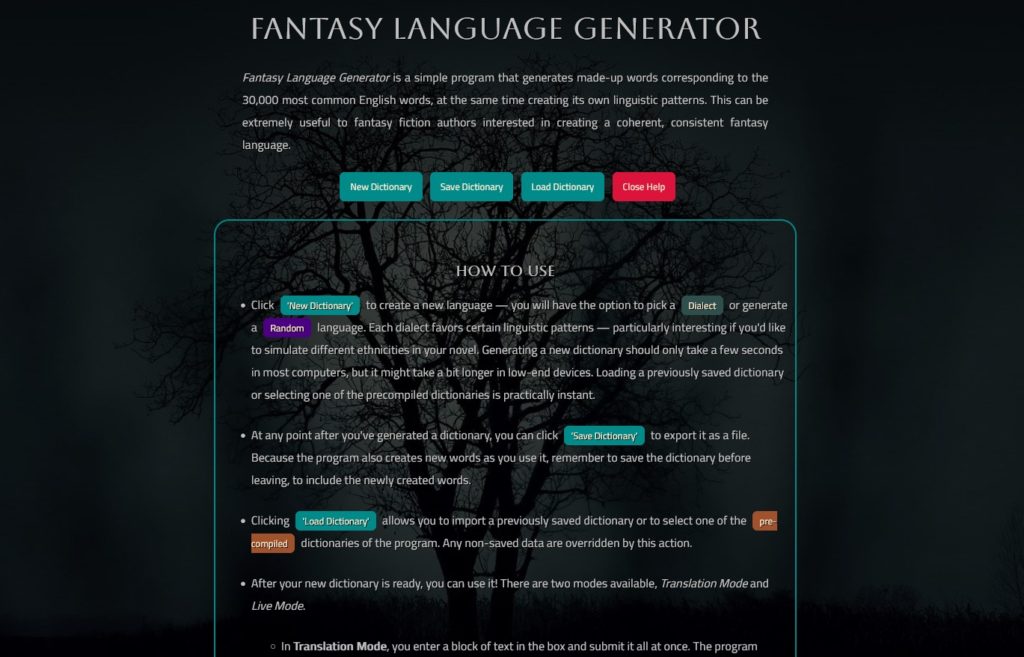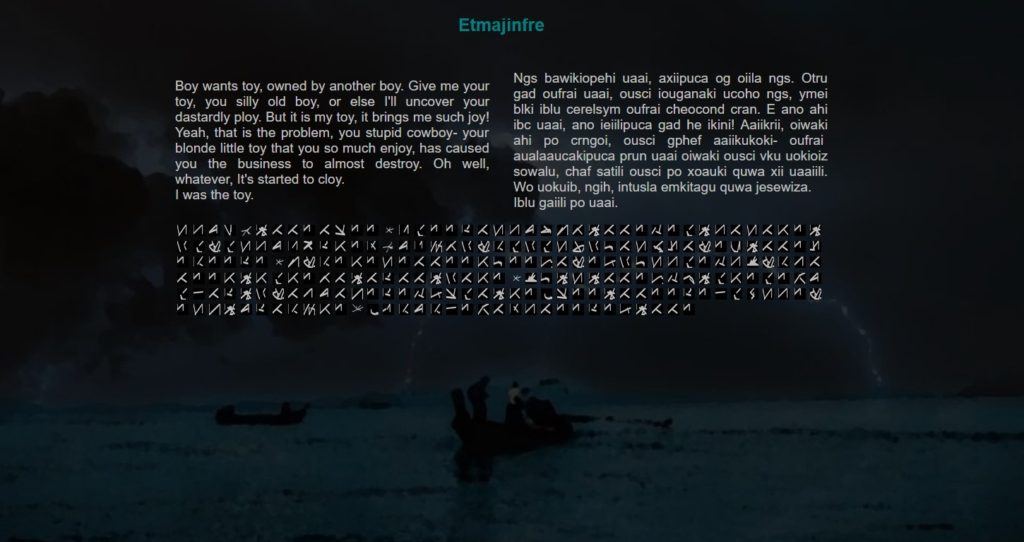October 10, 2022
Fantasy Language Generator: Create a Language in Seconds
Yboa Haeinaeiki Igiovalu. This means Fantasy Language Generator in… Sicrespind – a fantasy language I created with the help of my academic background, my creativity, and some JavaScript. If you’re a fantasy fiction author – or simply someone interested in a program that creates an entire language in a matter of seconds – this post is for you!
Fantasy Language Generator generates made-up words corresponding to the 30,000 most common English words, at the same time creating its own linguistic patterns – for instance, its own set of suffixes, prefixes, tense and noun markers, among others. I’ll show you more examples in this post.
All this can be extremely useful to fantasy fiction authors interested in creating a coherent, consistent fantasy language.

How Fantasy Language Generator Works
The basic idea is simple: The program begins by generating a word-to-word correspondence to its dictionary of the 30,000 most common English words. That is, in a matter of seconds, it generates a list of 30,000 made-up words, keeping a reference to the English word.
The rules used to generate the words are either (semi-)random or depend on the type of language you choose – in the context of the program these are called, somewhat misleadingly, dialects: Rural, Mountainous, Oceanic, North, Urban. Each dialect favors certain linguistic patterns – particularly interesting if you’d like to simulate different ethnicities in your fantasy novel.
Then, when you use the dictionary (more on this below), Fantasy Language Generator analyzes the words you enter for aspects such as tense, number, part of speech, etc. and assigns it its own suffix or prefix.
Let’s see an example!
Orange cats and white lions like you, but this white cat and this orange lion don’t like you.
Thghou eigroodoraz zai kyro osgoodoraz eigo shifru, cha oisq kyro eigro zai oisq thghou osgo sworipost eigo shifru.
I used the Mountainous dialect to generate this example. Notice how “eigro” (“cat”) becomes “eigroodoraz” in plural, the same way “osgo” (“lion”) becomes “osgoodoraz”, -odoraz being the plural marker in this fantasy language.
Fantasy Language Dialects
How about the same phrase in another dialect? Let’s see Oceanic, for instance:
Orange cats and white lions like you, but this white cat and this orange lion don’t like you.
Ueipie trtefraret yawi nlaki yawioueyukifraret pi ngie, scoc wa nlaki trte yawi wa ueipie yawioueyuki plichar pi ngie.
Another interesting thing is that each dialect has sets of markers for (some) nouns and verbs. Let’s see a list from the North dialect:
Bigotry, animation, plural, cigarette
Chocinen, honen, jnep, funen.
As you can surely conclude, the marker -nen often signifies nouns in the North dialect.
Another feature is the way Fantasy Language Generator creates common morphemes (in plain terms: the beginning of the word) for thematically similar words. Here’s an example:
Forest, wood, tree — apple, orange, fig
Oisphi, oismi, oispe — skosk, skousc, skoubr.
Of course this reflects real-world languages – think of the common origins of words such as “region”, “regal”, or “regulate”.
Other Functionality
There are two modes available in Fantasy Language Generator: Translation Mode and Live Mode.
In the former, you enter a block of text in the box and submit it all at once. The program translates the excerpt and displays it – translation can be both into and from your fantasy language. In Live Mode, you enter one English word at a time and the program displays the result in your created fantasy language as you type.
Fantasy Language Generator has certain ways of dealing with words that don’t have a direct match in its 30,000-word dictionary. First, it detects if the word you entered is still an English word – using my favorite RiTa library – and if so, it creates a new corresponding word on the fly. If there is no match, it attempts to see whether there is a near match (e.g. “super-market” vs “supermarket”). If everything else fails, it marks the word as unknown with a series of question marks.
Fantasy Language Generator: Writing System and Exporting Capabilities
Another intriguing aspect of this program is its writing system! What’s a fantasy language without its own ideographs, right? So I programmed a way to generate such characters, creating corresponding matches to the most common words (a bit like Kanji characters in Japanese), plus characters depicting phonemes.
It’s easier to see with an image (there’s a self-referential quality in this statement, if you noticed):

If you don’t like ideograms, there’s also the option to disable them. Of course, you can also save the dictionary of any language you create – including words created on the fly, as I described above. Ideograms are also saved. You can also export any text you generate, either in Live Mode or Translation Mode.
Where to Find
You can try Fantasy Language Generator following this link. For a full list of my available programs, see the relevant page on the main site.
I don't show you ads or newsletter pop-ups; everything is offered for free. Wanna help support a human internet?
